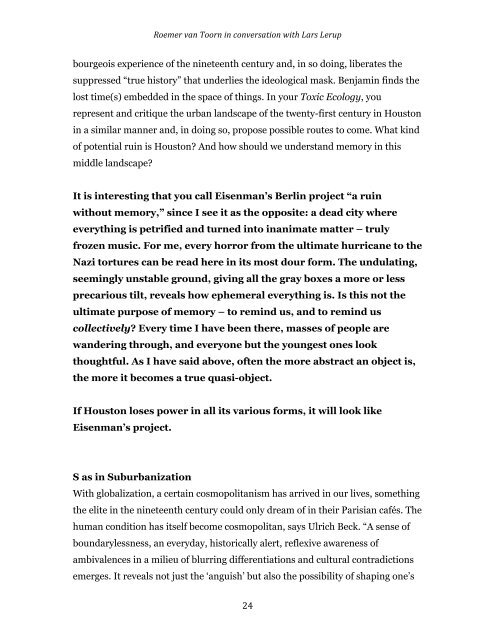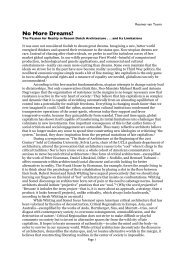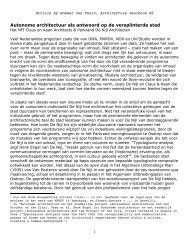ABCD Lars & Roemer
ABCD Lars & Roemer
ABCD Lars & Roemer
Create successful ePaper yourself
Turn your PDF publications into a flip-book with our unique Google optimized e-Paper software.
<strong>Roemer</strong> van Toorn in conversation with <strong>Lars</strong> Lerup <br />
bourgeois experience of the nineteenth century and, in so doing, liberates the<br />
suppressed “true history” that underlies the ideological mask. Benjamin finds the<br />
lost time(s) embedded in the space of things. In your Toxic Ecology, you<br />
represent and critique the urban landscape of the twenty-first century in Houston<br />
in a similar manner and, in doing so, propose possible routes to come. What kind<br />
of potential ruin is Houston? And how should we understand memory in this<br />
middle landscape?<br />
It is interesting that you call Eisenman’s Berlin project “a ruin<br />
without memory,” since I see it as the opposite: a dead city where<br />
everything is petrified and turned into inanimate matter – truly<br />
frozen music. For me, every horror from the ultimate hurricane to the<br />
Nazi tortures can be read here in its most dour form. The undulating,<br />
seemingly unstable ground, giving all the gray boxes a more or less<br />
precarious tilt, reveals how ephemeral everything is. Is this not the<br />
ultimate purpose of memory – to remind us, and to remind us<br />
collectively? Every time I have been there, masses of people are<br />
wandering through, and everyone but the youngest ones look<br />
thoughtful. As I have said above, often the more abstract an object is,<br />
the more it becomes a true quasi-object.<br />
If Houston loses power in all its various forms, it will look like<br />
Eisenman’s project.<br />
S as in Suburbanization<br />
With globalization, a certain cosmopolitanism has arrived in our lives, something<br />
the elite in the nineteenth century could only dream of in their Parisian cafés. The<br />
human condition has itself become cosmopolitan, says Ulrich Beck. “A sense of<br />
boundarylessness, an everyday, historically alert, reflexive awareness of<br />
ambivalences in a milieu of blurring differentiations and cultural contradictions<br />
emerges. It reveals not just the ‘anguish’ but also the possibility of shaping one’s<br />
24






